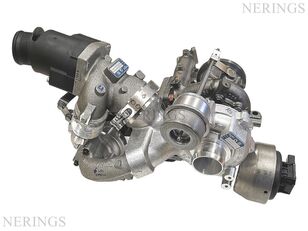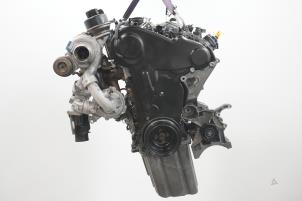Shop the most up to date Amarok Engine for Sale-- Excellent Prices and High-Quality Engines
Shop the most up to date Amarok Engine for Sale-- Excellent Prices and High-Quality Engines
Blog Article
Browsing the Process of Engine Choice: Secret Variables to Think About
The process of engine choice is a diverse endeavor that requires cautious assessment of numerous essential elements to ensure alignment with operational goals. Efficiency needs, gas effectiveness, and financial restraints are just the beginning; factors to consider around environmental effect and maintenance support play an essential function in the decision-making structure. Understanding just how each of these elements engages can significantly affect the effectiveness and longevity of your investment. However, the complexities of each element might not be right away evident, prompting more evaluation of exactly how to strategically browse this complex landscape.
Efficiency Demands
When selecting an engine, it is essential to develop clear performance requirements that align with the desired application. Efficiency requirements include a series of variables, including power output, torque attributes, and responsiveness, which must be customized to the details demands of the vehicle or machinery in question.
Power outcome, normally measured in horse power, establishes the engine's ability to push a vehicle or do a job successfully. Torque, on the other hand, is essential for applications requiring solid initial velocity or heavy training capacities. An understanding of the operational atmosphere is also important; for instance, engines designed for off-road applications might require various efficiency qualities contrasted to those meant for freeway usage.
Additionally, think about the operational load and obligation cycle, as these variables influence the engine's long life and integrity. In high-load circumstances, a durable engine style may be required to avoid early wear or failing. Additionally, efficiency requirements need to also integrate factors to consider for exhaust standards and governing conformity, specifically in areas with stringent environmental laws. By specifying these efficiency parameters early in the selection procedure, stakeholders can make enlightened decisions that enhance total operational effectiveness and effectiveness.
Fuel Performance Considerations
While performance requirements are important, fuel effectiveness is equally crucial in the engine option process, as it straight affects operating expense and ecological sustainability. Fuel-efficient engines eat much less gas each of job done, which not just minimizes overall expenditure yet also minimizes greenhouse gas exhausts. As companies increasingly focus on sustainability, choosing an engine that optimizes gas performance can enhance corporate duty and compliance with environmental regulations.
When reviewing gas effectiveness, it is essential to take into consideration the engine's design and technology - amarok engine for sale. Advancements such as turbocharging, straight fuel shot, and hybrid systems can significantly improve gas economic situation. In addition, understanding the operating conditions and duty cycles of the engine application is essential; engines may execute differently under differing loads and speeds
Moreover, manufacturers usually offer gas usage data that can be used to contrast various engine alternatives. In summary, fuel performance is a multi-faceted consideration that needs comprehensive analysis throughout the engine selection process.
Budget and Cost Analysis
Budget plan and cost analysis works as a crucial element in the engine option process, affecting both temporary investments and lasting functional costs. When evaluating prospective engines, it is important to consider not just the preliminary acquisition rate yet additionally the total cost of ownership, which incorporates setup, maintenance, fuel consumption, and potential downtime.
A thorough evaluation needs to start with the ahead of time prices related to the engine, including essential adjustments or supplementary devices. Concentrating entirely on preliminary expenditures may lead to illinformed choices. Assessing operating expense over the engine's life expectancy is just as essential, as a lot more expensive engines could offer remarkable gas performance or reduced maintenance demands, eventually leading to cost savings.

Ecological Effect Factors
Comprehending environmental impact aspects is important in the engine selection procedure, as sustainability factors to consider have ended up being increasingly essential for both regulative conformity and business responsibility. Organizations should examine the discharges produced by various engine types, including carbon dioxide, nitrogen oxides, particulate matter, and unburned hydrocarbons. These exhausts contribute considerably to air pollution and environment change, demanding a mindful analysis of the engine's eco-friendly footprint.
In addition, gas kind plays a crucial function in ecological impact. Engines powered by renewable resource resources, such as biofuels or hydrogen, often tend to have a lower environmental influence contrasted to typical fossil gas. Additionally, the lifecycle analysis of the engine, from manufacturing through operation to disposal, need to be considered to comprehend the complete range of its ecological effects.

Maintenance and Support Choices
When selecting an engine, the accessibility of upkeep and support alternatives is a critical consideration that can significantly influence operational efficiency and durability. Comprehensive maintenance prepares make sure that the engine operates at peak performance and minimizes unexpected downtimes. It is essential to evaluate the manufacturer's assistance network, including the accessibility of qualified service technicians and service centers.
Analyzing the accessibility of spare parts is also vital. A reliable supply chain for components can decrease preparations for fixings and upkeep, thus improving general performance. In addition, take into consideration the ease of acquiring technological documents and training sources, which are essential for making sure that workers are fully equipped to handle regular and emergency situation scenarios.
An additional important factor is the guarantee and solution contracts offered by the manufacturer. These agreements can supply comfort and economic protection against unanticipated concerns. Eventually, an aggressive approach to upkeep and support not just prolongs the life of the engine however also contributes to the general success of the procedure. Mindful consideration of these aspects will certainly cause informed decisions that align with functional goals and spending plans.
Final Thought
Finally, the procedure of engine choice necessitates an extensive evaluation of different important aspects, including performance requirements, gas effectiveness, budget plan restrictions, ecological effect, and maintenance support. find here By diligently examining these elements, educated choices can be made that line up with functional purposes and sustainability objectives. Eventually, a tactical approach to engine choice will certainly ensure optimum performance and longevity while addressing financial and environmental considerations efficiently.
While efficiency needs are vital, fuel efficiency is equally crucial in the engine option procedure, as it directly influences operating costs and environmental sustainability. As organizations progressively prioritize sustainability, selecting an engine that optimizes fuel performance can boost corporate obligation and conformity with environmental policies.
Additionally, comprehending the operating problems and Our site task cycles of the engine application is essential; engines may perform in different ways under differing speeds and tons. (amarok Check This Out engine for sale)
Assessing operating costs over the engine's life-span is just as vital, as more costly engines might use premium fuel efficiency or minimized upkeep requirements, ultimately leading to set you back savings.
In verdict, the process of engine selection necessitates a comprehensive analysis of various essential factors, including performance needs, fuel effectiveness, budget restrictions, ecological influence, and maintenance support. - amarok engine for sale
Report this page